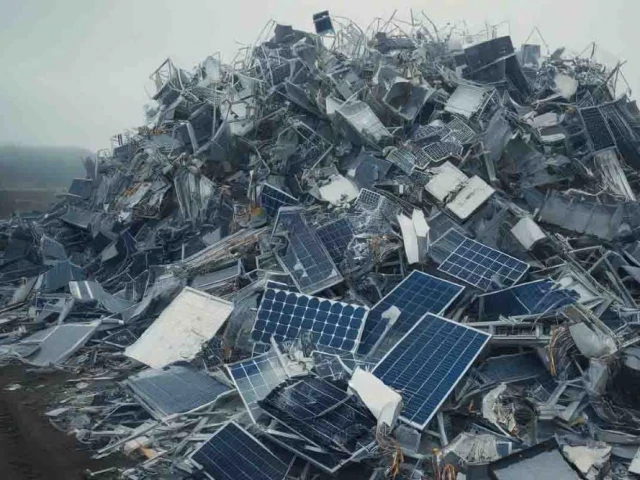LAHORE:
The energy crisis and the increase in electricity prices in Pakistan have attracted citizens to alternative sources, the most prominent is solar energy. From the installation of solar panels in the roofs to large solar parks, the sector is growing rapidly. However, critics warn that torrential rains, floods and management of poor waste as a result of climate change could turn the system into a new environmental crisis.
According to Dr. Salman Tariq, environmental professor and assistant at the University of Punjab, if the solar panels are submerged in water, their silicon cells and frames are broken, while the electrical connections become ineffective. “The batteries in particular can cause short circuits or fires. When lead and lithium ion batteries are damaged, toxic chemicals enter the soil and groundwater, causing respiratory, skin, renal and liver diseases,” said Drenq.
According to the data, Pakistan imported millions of solar panels and batteries with thousands of megawatt capacity in the last financial year. Since the average life of solar panels is 20 to 25 years and that of batteries is five to 10 years, it is likely that the waste generated due to their dismantling increases the collector in the coming years. Experts believe that if the management structure is not created now, the crisis could be intensified as current electronic waste (electronic waste).
Pakistan is already under pressure from electronic waste. According to a report published by the Global E-Waste monitor, Pakistan generates around 400,000 tons of electronic waste every year, including mobile phones, computers and refrigerators. Punjab is the province of worse blow in this regard, where old goods end in informal waste markets and are eliminated insecurely. The use of acid and fire to extract metals in these markets is dangerous not only for the environment but also for the health of workers and children.
According to former Geologist Dr. Naeem Mustafa, a solution to this problem is urban mining, under which precious metals can be extracted from old equipment thrown into the cities of modern and safe ways. “If this process is organized, the economy can benefit and the environment can be saved from damage,” said Dr. Mustafa.
Mian Abdul Khaliq, an importer of solar panels, revealed that Pakistan urgently needed a solar waste management policy and a recycling structure, otherwise, the alternative energy system will lose its environmental benefits. “The recycling centers must be established to recover aluminum, copper and silicon of missing panels and batteries, which should receive tax incentives so that investors enter the sector,” Khaliq said.
According to environmental lawyer Altamash Saeed, the waste equipment directive, electrical and electronic is strictly applied to the European Union and there are clear recycling laws in Japan, but there is little regulation in this regard in Pakistan. “Internationally, the Basel Convention regulates cross -border transfers of hazardous waste, but its implementation in Pakistan is weak,” Saeed said.
Dr. Tariq emphasized that the Government should adopt the principle of extended responsibility of manufacturers to give responsibility for companies for the phase of subsequent use of their products. “If this system is established, not only the environment will be protected, but new employment opportunities will also be created. Otherwise, the dream of clean energy could become a new climatic crisis,” said Dr. Tariq.
Ali Ijaz, deputy director of the Punjab Environmental Protection Agency, revealed that there was currently not a comprehensive policy for electronic waste management in Pakistan, but the work was underway, and soon an effective strategy will be introduced. “New safety standards for solar facilities have been established so that the panels can support the effects of rain and strong winds,” Ijaz said.




